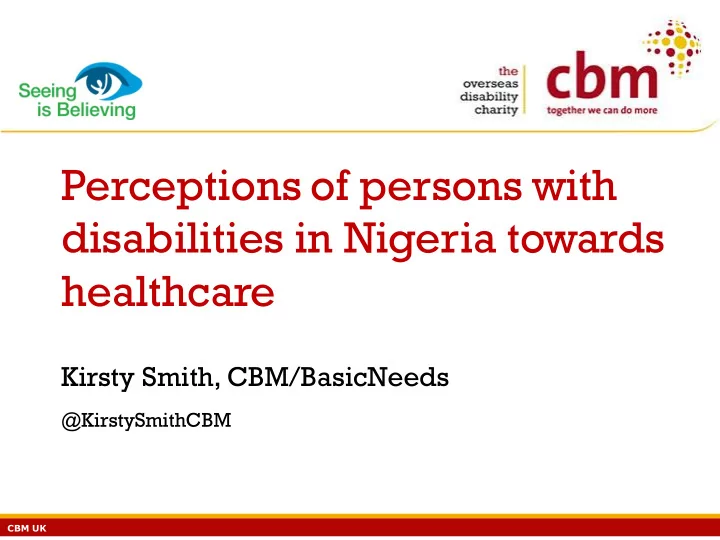

Perceptions of persons with disabilities in Nigeria towards healthcare Kirsty Smith, CBM/BasicNeeds @KirstySmithCBM CBM UK
Aim of study • To assess perceptions of inclusiveness of healthcare services amongst persons with disabilities, in two areas in Nigeria • For findings to guide planning, programme and policy formation • To be used in conjunction with endline survey to evaluate progress on inclusion, in two pilot health facilities CBM UK
Part of: Comprehensive Child Eye Health in Nigeria • Reducing avoidable blindness and visual impairment through provision of comprehensive child health services to 1.5m children in 11 Nigerian states (2017-20) • Consortium managed by CBM with Brien Holden Vision Institute • Funded through Seeing is Believing (SiB), Standard Chartered Bank’s global community investment programme CBM UK
Nigeria: Cites of study Gwagwalada Doma CBM UK
Methodology Literature review Quantitative data collection • 1513 people screened; 165 people with disabilities identified to participate (75% male, 25% female) • Household surveys – 126 respondents • Street-based surveys – 39 respondents Qualitative data collection • Focus group discussions – 19 key opinion leaders • In-depth interviews – 20 persons with disabilities, parents of children with disabilities; 2 Departmental Head of pilot health facilities CBM UK
Key findings: Access to healthcare Very Hard Hard Normal Easy Very Easy Don't Know Not Applicable 0 20 40 60 80 100 Do health facilities you need regularly make it easy of hard for you to use them? CBM UK
Key findings: Responsiveness of healthcare the cleanliness in the health facility? 72.7% 17.6% 9.7% how clearly health care providers explained 78.8% 9.7% 9.1% 2.4% things to you? your experience of being treated 80.6% 4.9% 12.1% 2.4% respectfully? the way the health services ensured that 72.7% 9.7% 15.2% 2.4% you could talk privately to providers? the ease with which you could see a health 75.8% 4.2% 14.6% 5.5% care provider you were happy with? your experience of being involved in making 67.9% 3.0% 22.4% 6.7% decisions for your treatment? the amount of time you waited before being 51.5% 4.9% 26.1% 17.6% attended to? 0% 20% 40% 60% 80% 100% Very Good Good Not Good/Bad Bad Very Bad CBM UK
Key findings: Satisfaction with Nigerian health system How would you rate the way health care in your country involves you in deciding what services it 4.9 75.2 13.9 6.1 provides and where it provides them? In general, how satisfied are you with how the health care services 7.3 74.6 12.1 5.5 are run in Nigeria? 0% 20% 40% 60% 80% 100% Very satisfied Satisfied Neither satisfied / dissatisfied Dissatisfied Very Dissatisfied CBM UK
Key findings: Attitudes of healthcare staff 100% 105-114 7% 8% 9% 90% 95-104 13% 15% 17% 80% 85-94 70% 75-84 24% 60% 65-74 34% 44% 50% 55-64 24% 45-54 40% 14% 35-44 30% 6% 13% 25-34 12% 20% 11% 1-5 9% 10% 8% 7% 0% St Mary Hospital, Gwagwalada General Hospital, Doma (n=70) All staff (n=138) (n=68) Attitudes towards Disabled Persons (ATDP) score CBM UK
Key findings: Qualitative • Expectations of inclusive education and health service providers – further inclusion needed, education as key facilitator • Understanding and satisfaction re inclusiveness of service provision – reasonable levels of satisfaction… • …. But still barriers in accessing services o Financial factors o Socio-cultural factors o Attitudes of Health Care Workers o Communication o Political will o Structural CBM UK
Key findings: Differing perceptions “When you go to the hospital, the doctors won't like to go close to them” (Person with a disability, Gwagwalada) “We have a good relationship with them though we have difficult ones amongst them” (Hospital health personnel, Gwagwalada) CBM UK
Conclusions, observations and learnings • Whilst there is a reasonable degree of satisfaction, the inclusion of persons with disabilities in the study area needs improvement • There is a gap in perceptions between people with disabilities and healthcare providers of inclusion in healthcare • Education plays a key part in people with disabilities seeking to access healthcare • The unexpected proves just as useful in research: the low number of women with disabilities identified in the study suggests further, gendered analysis of research methodology is needed CBM UK
Recommend
More recommend